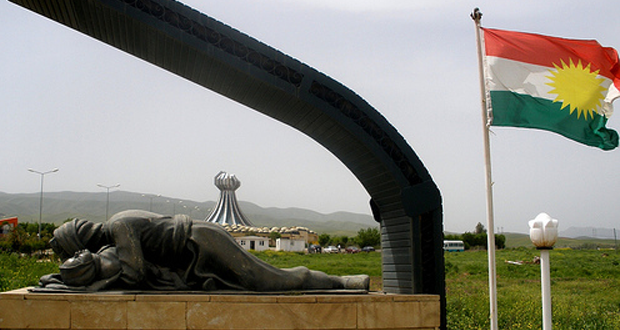In the month of March,
Listen to the cries of the mountains,
Listen to the pleas of the martyrs,
Ey Kurdistan
For the past 26 years Kurds have commemorated the gruesome chemical attacks on Halabja in a month that carries sorrow and festivities side by side, separated only by a week. Kurds around the world still lobby an international campaign for the United Nations to recognize the atrocities as a genocide, although the international community has disclaimed responsibility thus far. The question we need to ask ourselves is not whether Anfal was a genocide, but rather why we are still waiting for such a reluctant recognition 26 years later. Halabja has become a symbol of the many wounds the Kurdish people have been scarred with. It is to this day a powerful reminder of how history has created a collective memory that is burdened with the fragmentation of a country and people, but also with genocide after genocide: Dersim in Bakur, Qarne and Qalatan in Rojhelat, Halabja in Başur, as well as massacres and mass atrocities in Rojava.
Memory and experiences heavily impact a nation’s articulation of self, a well evident factor in the dynamic processes fundamental to the creation of a ‘collective memory’ and of modern historiography in an attempt to articulate a silence in Kurdish national identity. In ‘The Kurds: A nation of Genocides’ Kristiina Koivunen portrays how the genocide process has affected the Kurdish society and identity, remarking that a consequence of the genocide process has been that it stopped the national identity formation among Kurds. The genocide experience crippled not only the ones that fell victim to the attacks, but also victimized every Kurd to this day, and 26 years later we still await the international community’s recognition. To internationally recognize the genocide and declare March 16th as an international day against chemical and biological weapons would legitimize our nation’s pain. Furthermore it can rebuild a void in Kurdish collective memory, as Kurds would not have to identify with the victimizing past as a set representation of their national identity.
We cannot escape mourning in the month of March, as the brutality of the Anfal campaign will always be a bitter reality for Kurds. Nevertheless, it is dangerous to let it define us as a nation because when suffering is embodied it becomes the core of who you are. Thus, we become frozen in time as we relive the suffering of every man, woman and child that was deprived of an existence because of their identity.

